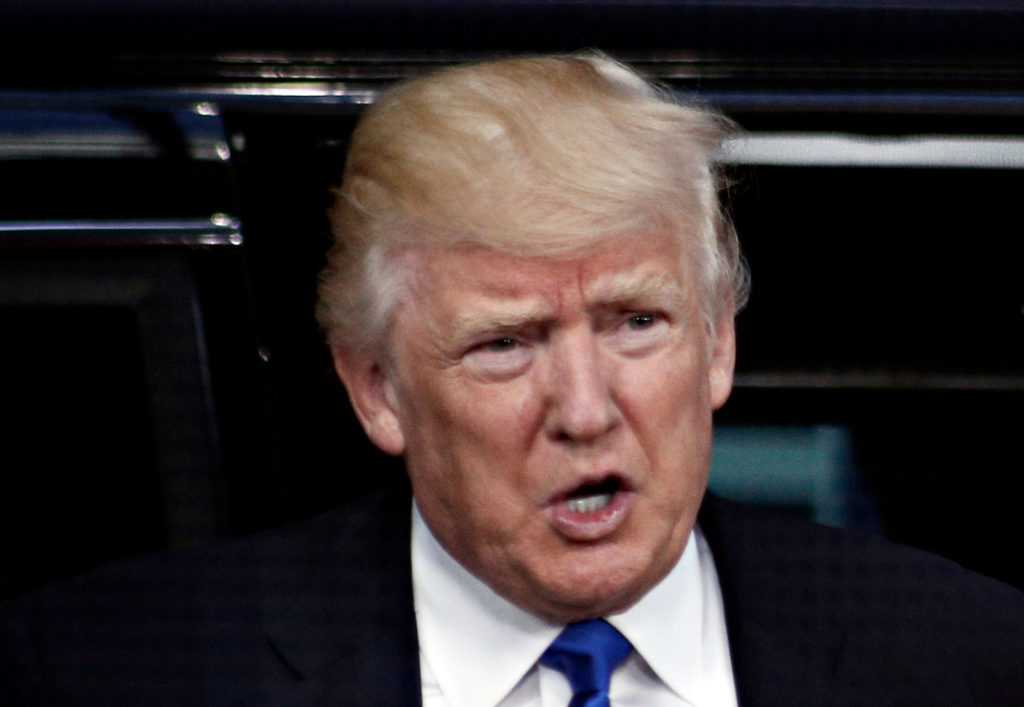Does this idiot have an off switch?

It is a testament to the fundamental corruptibility of human nature, and not to some inherent skill or charisma on the part of Donald Trump, that political discourse has now become weaponized. It is social media that takes this weaponization out of the realm of the age of conventional warfare and carries it into the nuclear age. So far I am being metaphorical, of course, but how much longer will Trump’s potential life-imperilling tweeting remain metaphor? And if one Donald Trump tweet leads to a death, or many deaths, will that stop him? This is not too much like taking Trump too seriously, because it may be that Trump’s tweeting has led to one or many deaths already, and it may only be a matter of time before the relationship between those tweets and specific deaths is established, or at least tested, in a court of law.
For now anyway, it is true that when Donald Trump tweets, people fear for their lives. I see no restraining force on Trump’s part except (and not always even then) when a tweet might land him in legal hot water. Trump’s recent and spurious tweet identifying a government employee as the whistleblower is a case in point. Cooler heads may have convinced him to delete that tweet, but up to that point he restrained himself (insofar as Trump is capable of restraint) from tweeting the person’s name. (As it turns out the tweet was deleted by a glitch with Twitter and has since been restored.)
Lawyers debate whether naming a whistleblower is a crime. Federal law expressly forbids inspectors general from making such an identification, but the law is silent about anyone else. What the law does specifically forbid, however, is retaliation against a whistleblower. Trump’s tweets may very well be construed as retaliatory, in that the objects of those tweets quite reasonably fear for their lives as a consequence.
One important ingredient in determining whether or not Trump intends his tweets as threats is his state of mind. States of mind are, by themselves, difficult to establish in a court of law. For example, it is relevant when a driver of a car injures a pedestrian whether or not the driver intended harm to the pedestrian. If harm was intended the penalty is vastly increased and can escalate the charge from assault to attempted murder. Establishing intent is important, and can be done by various means.
In Trump’s case, his state of mind toward the whistleblower may have already been established from a recording of his own voice from September of 2019. In it, Trump says, “Basically, that person [the whistleblower] never saw the report, never saw the call, he never saw the call—heard something and decided that he or she, or whoever the hell they saw—they’re almost a spy. I want to know who’s the person, who’s the person who gave the whistleblower the information? Because that’s close to a spy. You know what we used to do in the old days when we were smart? Right? The spies and treason, we used to handle it a little differently than we do now.” Clearly, Trump is referring to the death penalty. Even so, Trump is largely misinformed, which in itself is no surprise. Only one person has ever been executed for treason in the United States, William Bruce Mumford, who was convicted of treason and accordingly hanged in 1862. Presumably that is one of the examples of a time long past, in the twisted mind of Donald Trump, when America was “great.”
In any case this thug, this criminal, this goon in the Oval Office, will continue to imperil the lives of the citizens he is sworn to protect. Vengeance on him for his reckless disregard for the human lives he endangers may one day come in the form of a class action suit that could see judgments in the hundreds of millions or even billions of dollars. For a man who loves money as much as Donald Trump does, his absent impulse control could very well one day pauperize him. To see him in prison and so poor that he must resort to engaging a public defender against criminal charges is a delicious fantasy. Is it too indulgent of me to sincerely hope it will one day come to pass? I don’t think so.

Robert Harrington is an American expat living in Britain. He is a portrait painter.
